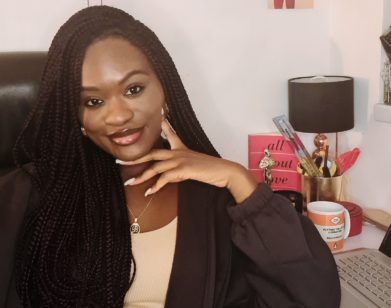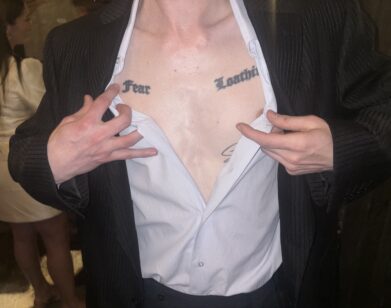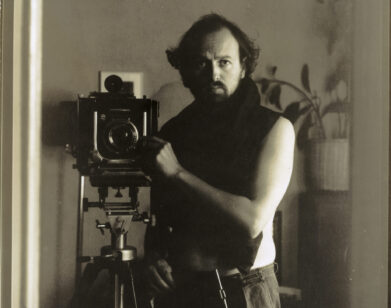BACKSTAGE
Susan Kelechi Watson Takes Us Behind the Scenes of the Gentrification Drama Good Bones
In James Ijames’ latest play, Good Bones, gentrification comes in fifty shades of gray. The stage is set up like a luxe kitchen mid-renovation, complete with plastic sheets that shroud the production’s first few minutes in a translucent haze. Aisha, played by Susan Kelechi-Watson, moves back to the historically Black neighborhood where she grew up, vaguely referred to as “The Heat,” in pursuit of a new job opportunity. The only catch? She’s a real estate developer who has to convince her community that a new sporting complex should be built where the public housing currently stands. Earl, the contractor who’s working on Aisha’s renovation, doesn’t buy it. The entirety of the two-hour play happens in that kitchen, including the climax where Aisha and Earl confront one another at a dinner that Aisha’s chef husband coordinates. “I want it gone because all I have ever known it to do is take and steal and kill and drain,” she proclaims. “Let it sink into the earth.” Kelechi-Watson embodies Aisha, though she doesn’t necessarily agree with her. “That was the interesting part of it,” she told me. “I’m so on Earl’s side of that conversation.” When we met up backstage after the show, whose run at the Public Theater has been extended through October 27th, the This Is Us actress explained how she ended up becoming Aisha’s “biggest advocate.”
———
SUSAN KELECHI WATSON: This is Helly. She helps me with wardrobe.
EMMA STOUT: Your costumes are so fab. All the power suits.
WATSON: I know, right? She came through with the come through.
STOUT: I could see Kamala wearing some.
WATSON: That peach one, very Kamala.
STOUT: How are you feeling after the show?
WATSON: I feel really great. I love the show so much. I love the process, and there was such a process to this. It started off as a whole different play. They had commissioned it down in DC. Just to give you an idea of how different it was, Aisha was nine months pregnant when the play was first shown. And her water broke at the big dinner scene.
STOUT: So that was the original ending?
WATSON: Well, no. Then it was a flash forward three years into the future.
STOUT: Wow. That changes the meaning.
WATSON: It changed everything. So much had to change while we were doing it, but it deepened. More backstory came into it, and other things developed. Less of the ghost off-stage happened. We had time to really sit with the play and mine it and hear what it really wanted to be. And then this is kind of the result. So I’m really proud of it.
STOUT: It must be sort of a marathon for you, because you’re pretty much on stage for the full running time. And there’s no intermission. Is it exhausting?
WATSON: Tech rehearsals, in particular. I didn’t get many breaks because I’m on the stage the whole time. Tech rehearsals are probably 10 hours a day, so if we got a 10-minute break, that was the break that I got. But I like being in rehearsal. I like to dig in and find things. This one was really special because Aisha was really special to me. I understood what the challenge was and I was here for it. But full disclosure, I’m rehearsing another play during the days now while I’m doing this. That’s tiring.
STOUT: What makes Aisha such a special character for you?
WATSON: She’s just real. I think she’s somebody who’s really lost. She has no past in her mind. All her past was so negative, and she’s put it all behind her. She doesn’t have any family. So she’s sort of this rolling stone. She keeps trying to look for satisfaction in all these places, and she just can’t find it. That’s really the reason why she keeps moving from job to job to job– she can’t find a home. So she moves back to her original hometown and thinks, “Well, maybe if I change it to be what it should have been, this will feel like home.” And then she realized that she wasn’t even at home there. The problem’s really within her– feeling like she doesn’t belong anywhere, that she doesn’t have any people. Not realizing that the people around her want to be her people. She’s just not letting them in.
STOUT: Yeah, I think that’s what made the play so interesting. Externally, it’s about gentrification, but really it’s about someone’s relationship to home and how conflicting that can be. We’re not too far from your hometown of Brooklyn. Do you relate to Aisha’s viewpoint at all?
WATSON: No, and that was the interesting part of it. I’m so on Earl’s side of that conversation. But I’ve spoken to people who are from inner cities, from Brooklyn specifically, who have lived in the projects and rough neighborhoods. They’re like, “Gentrify it, please. We don’t need all this violence and hardship.” There’s a lot of people who have had to struggle with that. We can glorify it as much as we want, but living that way is not the easiest. So I think I understood her point of view, I get it.
STOUT: There’s a truth to it. Do you feel protective of Aisha as a character?
WATSON: Hell yeah. I used to be like, “Listen, I’m advocating for Aisha right now.” You know what I mean? That’s how I would speak. I became her biggest advocate, for sure.
STOUT: You sort of appear on the stage like a ghost yourself, the way that Aisha emerges from behind sheets of plastic wrap. Then as her character unfolds, the set also comes more into focus.
WATSON: I think she’s connecting with being back in that space. She’s connecting with the ghosts of the past. At the beginning of the play, she’s closing the doors to the house because she wants the world out. And by the end of the play, she lets the world in and you hear the laughter from outside. So you just see the outside has been trying to permeate the inside. You see that whatever has been in the house is trying to remind her of what’s outside, and that that is joyful.
STOUT: And I love the ending, because it really felt like the beginning. That was when all the characters sat down to have a real conversation. What was it like to work with the other three cast members?
WATSON: Oh my god, I love them. I brought them all in here today to tell them that I love them. I was like, “When I text y’all, you better respond. Don’t just be putting heart, thumbs up, smiley face.” They really have become such a family to me. They will be very surprised how much I text them. One thing that was really important for me, in every scene, was to make sure there was connection. There’s truth-telling and storytelling and being there, really being with someone as they’re speaking. There’s not a lot of music, just people talking and telling stories. And I think that we really did that. One thing that we did on stage and off stage was connect and tell our stories.
STOUT: You were talking about storytelling, and one of the best storytellers is James Ijames. You guys do such a great job of bringing his words to life. What is it like to work with him? I mean, he’s such a force.
WATSON: Oh, I love him. James is so easy to work with. He’s so great. He listens to actors. He was an actor himself, but he loved playwriting more. Artists should have a certain protection of their work, so you don’t just give over to any suggestion. But I know that he hears every suggestion, he takes everything into account, and he wants it to feel good for the actors. He wants the words to feel right in their mouths. This was a unique process because he was still writing while we were working on it, so there was a lot of back and forth. But what a great collaborator, and what a fast writer. He would come back in a day or two and have whole scenes written with huge changes. It was incredible.
STOUT: I think one of the most important parts of the play is that it’s an insular conversation about gentrification amongst only Black characters. But I noticed when I was watching that most of the audience was white. Do you think that adds to the dynamic of the play being watched and received?
WATSON: I think there are going to be some things that are missed, just because they’re culturally specific. We had a Black night a few nights ago, and we had to pause and wait for laughter because nothing was missed. Every single thing you get. And when the audience is mostly white, that’s not going to happen. But it’s also important to see Black people just being. There’s no stereotypical circumstance or treacherous hardship. It’s just life. I always feel like it’s important to have that as part of the conversation, so that we’re seen in a well-rounded way which is still something that feels new to people. And that’s beyond me, but it’s not my problem. I do feel that there is a difference, and there will always be that. I’m sure if an Irish play was done with an Irish audience, it would be popping. But when there are real differences, the audience listens differently. It’s interesting to hear how they listen.
STOUT: Right. And it’s not just race that’s brought up in the play. It’s certainly class. That’s a very big part.
WATSON: Téa [Guarino] is like my little sister, by the way. I think she’s going to come back.
STOUT: You guys share this dressing room, right?
WATSON: Yeah.
STOUT: I loved her perspective in the play because it was so Gen Z. And there were not only these class differences, but also these massive generational differences among the characters.
WATSON: Yeah. Because you have Millennials and then Gen Zers, and their perspectives are so different at this stage. It’s interesting because her perspective is so open.
STOUT: Do you think that that’s true of Gen Z?
WATSON: Shoot. I feel like there is a sense of wanting that, but also not quite knowing how to get it.
STOUT: Do you think the play advocates for that sort of openness and optimism?
WATSON: I think it’s advocating to see gentrification from different perspectives. That’s the main thing to me. There’s so many different ways to see that argument within one community. What happens when this is not a Black-white conversation? When it’s amongst Black people, there’s all these different conversations within that.
STOUT: Yeah, Aisha is emotionally driving the play, but I’m not sure that her stance is ever resolved.
WATSON: Right. I think she’s going to search for it. At the end of the play when Travis says, “You were right,” and she’s like, “Not yet,” I think that’s true. She’s going to try to figure it out from there.
STOUT: There was a little dynamic between Aisha and Earl at the beginning of the play, and it felt romantic. Was it intended to be?
WATSON: Yeah, for sure. I think it’s what happens when there’s tension in your marriage. Somebody makes you feel kind of good and light. It’s two attractive people in a room. You know what I’m saying? She’s not going to do nothing, but it’s like-
STOUT: It’s fun to flirt.
WATSON: It’s fun to flirt until you can’t do it anymore. She’s very overwhelmed. Things are tense in her marriage, in her work, she’s pregnant and she doesn’t quite know if she wants to be. And then in comes this guy who’s like, “Hey, you remember back in the days?” It’s that.
STOUT: What are you hoping the audience walks away from the play with?
WATSON: I hope they come away connected to the characters, to tell you the truth. I really do. I hope they feel a strong connection with the four of us. And also come away thinking about gentrification and the effects of it on people– how to come into a space and not try to change the culture of it. Even though you want to upgrade it to maybe make it a nicer or more beautiful neighborhood, you don’t have to erase the culture that was there. I think that’s really important.
STOUT: Spoken like a true Earl. That’s a great note to end on.
WATSON: Yay.







